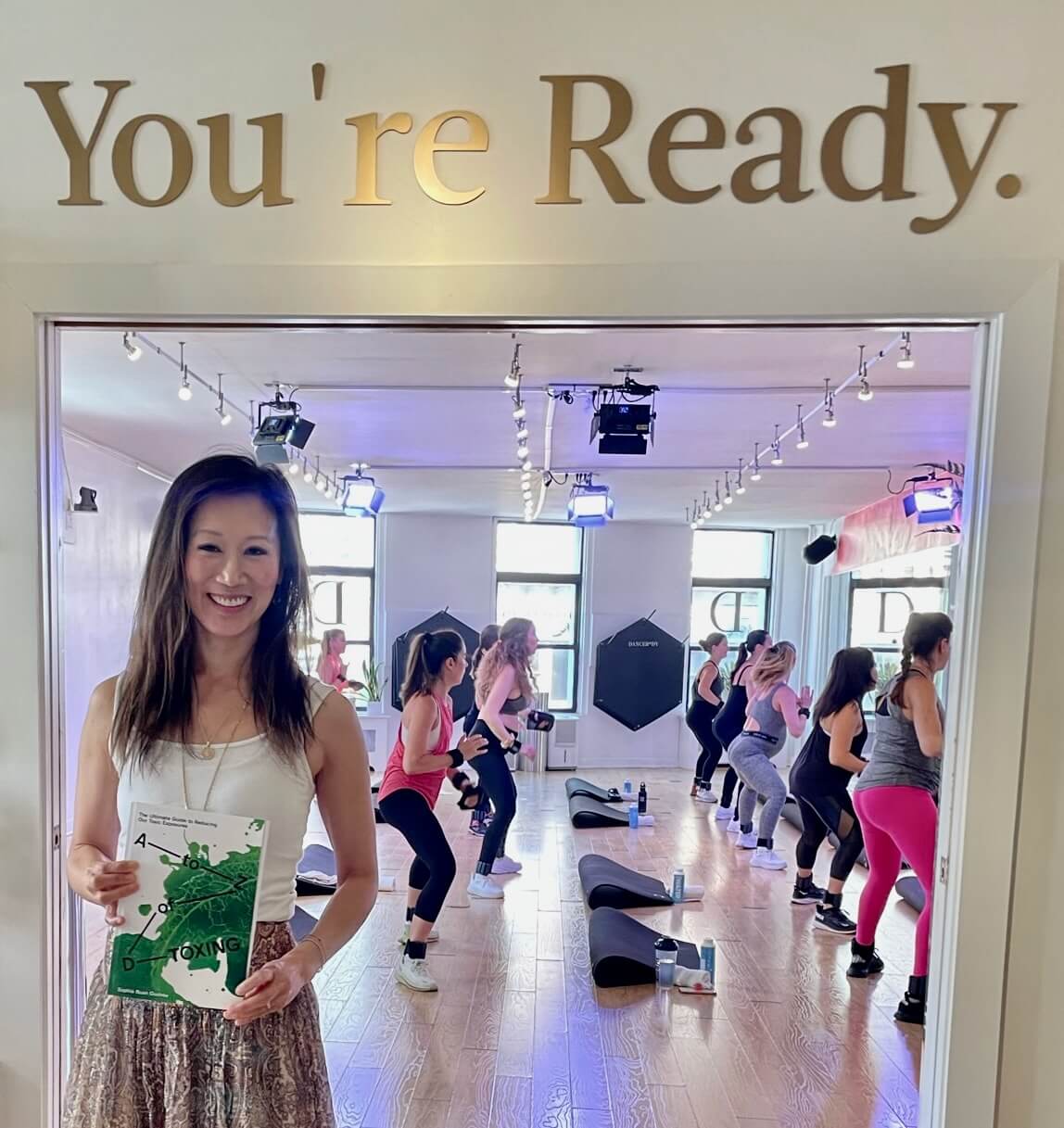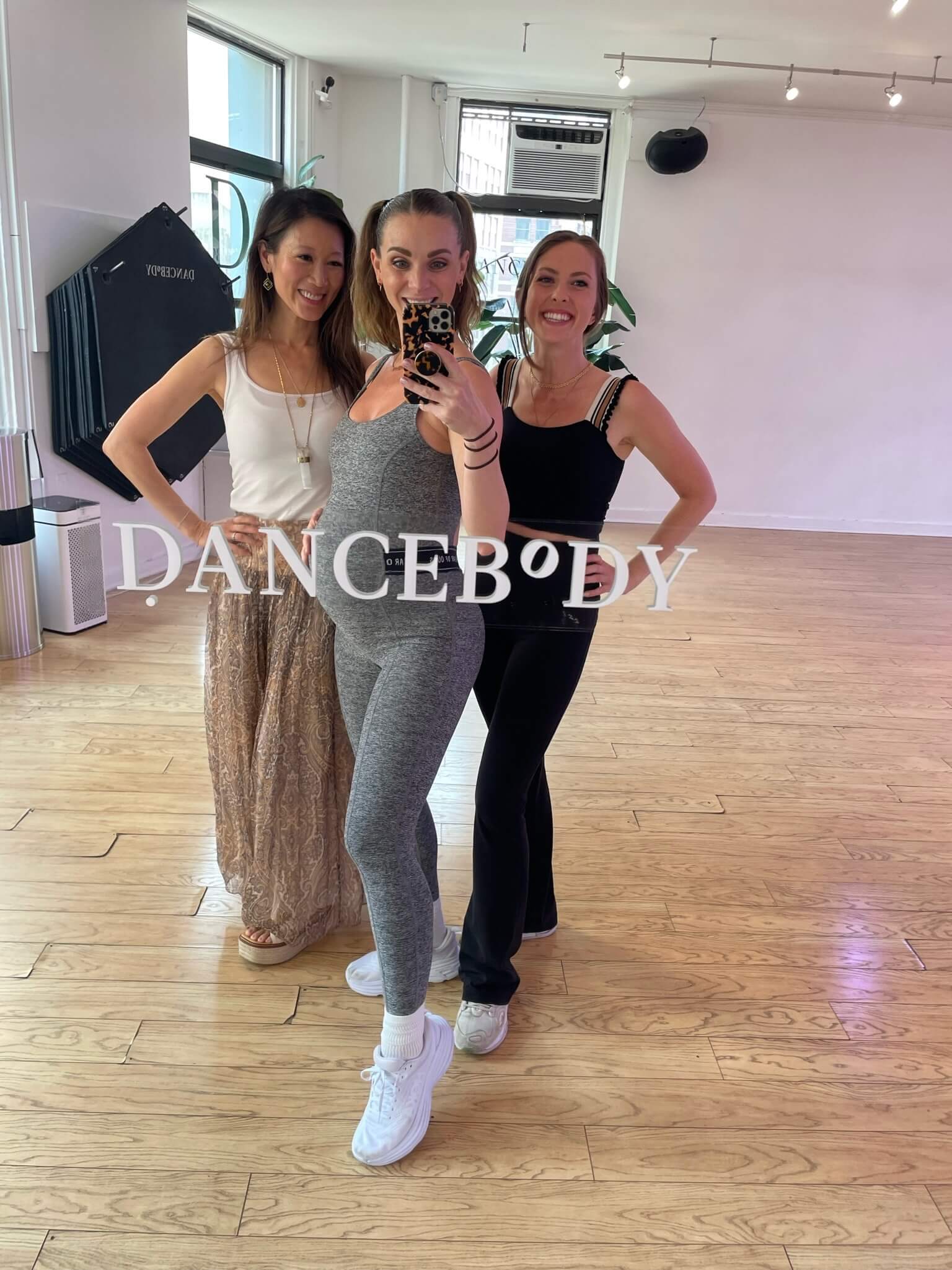5 Detox Tips I Wish I Knew When I Was Pregnant
Jun 13, 2023by Sophia Ruan Gushée
Recently, I was invited by DanceBody founder, Katia Pryce, to talk with her pregnancy dance cardio class in NYC's Nomad neighborhood. I shared the top five tips that I wish I knew when I was pregnant, and am sharing them below because everyone can benefit from being aware of these tips—even if you're not pregnant! Please scroll below to learn about these important ideas to reduce your toxic exposure.
1. Detox your body lotion
My skin has always been uncomfortably dry. So you can imagine how much more uncomfortable a growing pregnant belly can feel on stretching, dry skin!
When I was pregnant with my first daughter in 2006, a wonderful friend who had been through two pregnancies highly recommended a tub of body lotion that worked great for her—and for me! While I wasn't thinking about toxic exposures in 2006, I felt better seeing the nontoxic packaging with its all-natural packaging design. It led me to believe that it was nontoxic.
After my daughter was born, I started to learn that this body lotion that I had used during my pregnancy—several times throughout the day and night—was filled with toxic chemicals like "fragrance" and parabens, a class of chemicals that are used as preservatives.
Fragrance
Fragrance is a recipe that can include up to hundreds of unique chemicals, including those that can cause toxicity to the brain, nervous system, reproductive system, and more.
Manufacturers are not required by the U.S. government to disclose all ingredients or to ensure that they are safe due to laws that protect confidential business information. So it's hard to know whether "fragrance" in a product is safe. One study, which I wrote about in A to Z of D-Toxing: The Ultimate Guide To Reducing Our Toxic Exposures, found the following:
- 314 fragrance industry chemicals known to cause biological mutation
- 218 caused reproduction problems
- 778 caused acute toxicity
- 146 cause tumors
- 376 caused skin and eye irritations

Parabens
Parabens is a class of chemicals that are used as preservatives in lotions as well as many other products. They have also been detected in the urine of most people that have been tested, according to the Centers for Disease Control and Prevention, which indicates widespread exposure in the U.S. population. A recent study estimates that over 90 percent of people in the United States have parabens in their bodies, according to Breast Cancer Prevention Partners.
Certain demographics tend to have higher paraben levels. For example, the CDC reports that "females had several-fold higher concentrations of methylparaben and propylparabens than males, which likely reflect the greater use of products containing parabens." And, among adults younger than age 60, non-Hispanic blacks had higher levels of methylparaben than non-Hispanic whites. One explanation is that hair products (such as hair creams, relaxers, and stylers) marketed and used by African Americans are more likely to contain parabens than products used by whites. People in high-income households also tended to have higher concentrations.
So are parabens safe?
Some say that we don’t know. Others say that we know enough.
The CDC says that the presence of parabens in urine does not imply that they cause an adverse health effect. But the CDC also acknowledges that the human health effects from environmental exposure to low levels of parabens are unknown.
It bothers me, especially for pregnant and nursing moms, that parabens have been detected in human tissues (including the breast tissue of patients with breast cancer), bodily fluids (including breast milk), and can cross the placenta barrier. Some hypothesize that the estrogenic properties of parabens may play a role in breast cancer development. This continues to be studied. (PubMed 2013)
While FDA scientists continue to review published studies on the safety of parabens but do not feel the need to regulate parabens further (FDA 2022), the nonprofit Breast Cancer Prevention Partners explains that parabens are known endocrine disruptors that can mimic estrogen in the body. “Several studies have shown that parabens can affect the mechanisms of normal breast cells and potentially influence their abnormal growth, leading to increased risk for breast cancer.”
In the meantime, the European Union banned some parabens.
Who is most vulnerable to the health effects of parabens?
Consistent with other toxic exposures, the most vulnerable populations to the health effects of parabens are pregnant women, fetuses, and young children. For example, breast tissue is most susceptible to endocrine disruptors during these life stages, according to Breast Cancer Prevention Partners. And certain U.S. states, like Washington, consider some parabens of high concern to children.
Use moisturizers that are safe enough to eat
After realizing how many ingredients of moisturizers can penetrate my skin and enter my bloodstream, placenta, and breast milk—and how many more are unstudied—I started moisturizing with oils that are safe enough to eat: mainly coconut oil during warm, humid months and olive oil or sesame oil during dry, winter months. For extra nourishment (including for joints), you can apply these oils before a shower so that the heat and steam from the shower can help the oils penetrate further into your body.
2. Avoid plastic water bottles and food containers when you can
In 2006, I was working in a corporate office, drinking lots of water from disposable plastic bottles. I didn't realize that hormone-disrupting chemicals, like bisphenol-A (BPA) were commonly found in plastic water bottles and could expose my unborn daughter. An easy change I would have made was to bring filtered water in a stainless steel or glass water bottle.
While I would have had to refill my water bottle with water from a plastic water dispenser, the thicker plastic from the water dispenser and its travel conditions (less sun exposure) may have had fewer contaminants—including microplastics—in the water.
3. Avoid microwave radiation and create distance when you can't avoid it
When I brought leftovers to work for lunch and reheated them in the microwave, I had the instinct to protect my pregnant belly by leaving the room to create distance from the operating microwave. I wish I extended this awareness to other sources of microwave radiation, like cell phones. I wish I was aware of the countless sources of microwave radiation (including cordless phones and closed laptops) and took more precautionary measures including creating more distance from them since microwave radiation weakens with distance.
4. Learn from microwave popcorn
While pregnant with my first child, I was often so proud of myself for eating microwave popcorn because, back then, I believed it was so healthy. After my daughter was born, I was heartbroken to learn about all the toxic exposures I imposed on my daughter through eating microwave popcorn.
- The inner lining of some microwave popcorn bags has been found to be coated with PFAS, or Forever Chemicals.
- Butter flavoring of some microwave popcorn products can contain a toxic ingredient, diacetyl.
Learning that such a seemingly harmless product—microwave popcorn—poses health risks from its toxic exposures was just one of too many other examples in most people's lives. Now, my family and I enjoy homemade popcorn.
5. Be mindful of wired technology—like laptops
Radiation is also emitted from wired technologies like laptops. I spent too many hours of one of my pregnancies with my laptop perched on my pregnant body while it was also plugged into an electrical outlet. I would NEVER do that again and wish that I could undo that. However, as we know better, we do better, as Maya Angelou coined.
Summary Detox Tips
In summary, the practical tips that you can learn from the top five things that I wish I knew when I was pregnant are below.
- Read product labels to avoid fragrance.
- Read product labels to avoid parabens. Common parabens that you may see and their synonyms include (FDA 2022):
- propylparaben (or propyl 4-hydroxylbenzoate),
- butylparaben (or butyl 4-hydroxylbenzoate),
- ethylparaben (or ethyl 4-hydroxylbenzoate)
- heptylparaben (or heptyl 4-hydroxylbenzoate),
- methylparaben (or methyl 4-hydroxybenzoate)
- Don't assume that children's products are safe from toxic chemicals, heavy metals, and harmful radiation.
- Oils that are safe enough to eat can be a great moisturizer (and makeup remover).
- Just because packaging design and language gives the impression of it being all-natural, organic, and nontoxic doesn't mean that it is necessarily.
- Be mindful of wireless and wired energy that you are exposed to—and your growing baby too! Do your best to be conservative about your EMF exposure.
- Reduce your use of packaged foods.
- “Artificial flavors” is often a cocktail of chemicals that don’t have to be disclosed on the ingredient list!! They also don’t have to be proven safe for human health and development.
- Trust your intuition/gut feeling over anything else! Especially when it comes to motherhood, there are so many opposing voices out there. Just do what feels right for you & your baby!
- DON’T STRESS! Empower yourself with the evidence at a pace that's comfortable for you.
- Remember to turn to Ruan Living's D-Tox Academy or 40-Day Home Detox when you're ready to edit your products, update your healthy living efforts to avoid toxic exposures, and inform your commonsense and tuition for guidance in eliminating toxic chemicals, heavy metals, and EMFs that you don't mind avoiding—while protecting your joy and convenience! The experiences above—and from writing A to Z of D-Toxing—inspired all that I’ve created to simplify nontoxic living for my younger self because I know that it can help you!🙂

About Sophia Ruan Gushée
Sophia Ruan Gushée is a nontoxic lifestyle expert and founder of Ruan Living, a wellness platform that empowers others to improve their health by mindfully reducing their exposure to hidden toxins in their everyday lives. Sophia is the author of A to Z of D-Toxing: The Ultimate Guide to Reducing Your Toxic Exposures and several detox workbooks. A graduate of Brown University and Columbia Business School, Sophia lives in New York City with her husband and three daughters. Her passion for empowering others to enjoy nontoxic living began with the birth of her first daughter in 2007. Everything she creates is a love letter to her children and the hope for a healthier, more mindful world.



